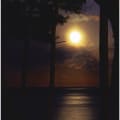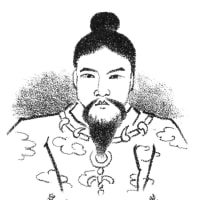『古事記』神武天皇 2 ≪改訂版≫
故、從其國上行之時、經浪速之渡而、泊青雲之白肩津。此時、登美能那賀須泥毘古自登下九字以音興軍待向以戰、爾取所入御船之楯而下立、故號其地謂楯津、於今者云日下之蓼津也。於是、與登美毘古戰之時、五瀬命、於御手負登美毘古之痛矢串。故爾詔「吾者爲日神之御子、向日而戰不良。故、負賤奴之痛手。自今者行廻而、背負日以擊。」期而、自南方廻幸之時、到血沼海、洗其御手之血、故謂血沼海也。從其地廻幸、到紀國男之水門而詔「負賤奴之手乎死。」男建而崩、故號其水門謂男水門也、陵卽在紀國之竈山也。
≪英訳≫
When Kamuyamato Iwarebiko no Mikoto (Emperor Jimmu) ascended from his country, he passed through the crossing of Naniwa, anchoring at Shirakata Port(the White-Shouldered Port) in Kawachi. At that time, he engaged in battle with the warrior Nagasunehiko, who resided in the land of Tomi in Yamato. Taking the shield on his imperial ship, he descended and stood his ground. Thus, the place was named Tatezuchi, later known as Tadetsu of Higashisumiyoshi. Then, during the battle with Nagasunehiko, the divine arrow of Itsuse no Mikoto pierced his hand. Therefore, he decreed, 'I am the divine child of the Sun, and it is not fitting to face the sun in battle. Thus, I bear the wounds of a lowly servant. From now on, I shall turn my back to the sun and strike.' During his travels to the south, he arrived at Chinu no Umi, where he washed his bloodied hand, thus it was called Chinu no Umi (the Sea of Blood Marsh). As he continued his journey, he arrived at the water gate of Wo(O) no Minato in the land of Ki. There he proclaimed, 'It is regrettable to die bearing the wounds of a lowly servant.' And he concealed himself. Hence, it was named O-no-Minato (Water Gate), located on Mount Kamayama in the land of Ki."
≪この英訳文の和訳≫
カムヤマトイワレビコ(神武天皇)が国を離れて上っておいでになる時、難波の湾を通り抜け、河内の白肩(しらかた)の津に船を停められました。この時、大和の国の富(とみ)に住んでいるナガスネ彦が軍を起こして立ち向かいましたので、御船に置いてある楯を手に取り、下り立たれました。それでその土地を楯津(たてづ)と呼びます。今でも日下(くさか)の蓼津(たでつ)と言われています。このようにナガスネ彦と戦われた時に、イツセの命(神武天皇の兄)が手にナガスネ彦の矢の傷を負われました。そのため仰せられました。「私は日の神の御子として、日に向かって戦うことは適切ではない。だから、賤しい者の傷を負ったのだ。これからは廻って行って、背中を日に向けずに攻撃しよう」と仰せられたのです。南の方から廻っておいでになる時に、和泉(いづみ)の国のチヌの海に到着し、手の血を洗われました。それでチヌの海と言われています。その地から廻っておいでになって、紀伊の国の男(を)の水門(みなと)に到着され、「賤しい者のために手に傷を負って死ぬのは残念だ」と仰せられ、そこでお隠れになりました。そのため、男の水門(をのみなと)と呼ばれています。御陵は紀伊の国の竈山(かまやま)にあります。
令和5年8月8日(火) 2023
≪改訂版≫













